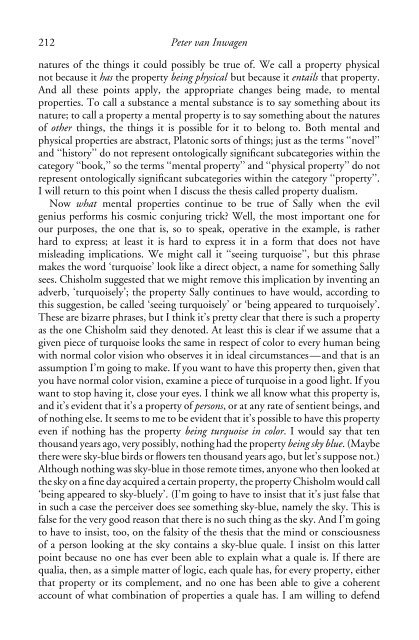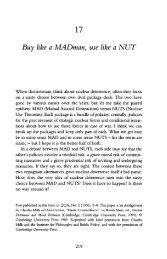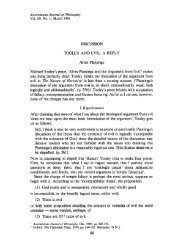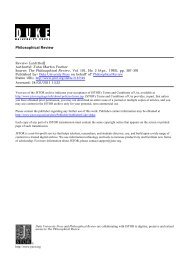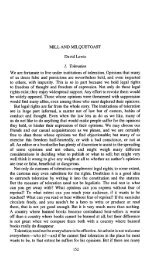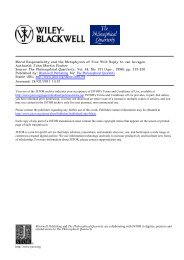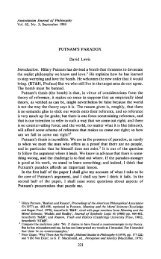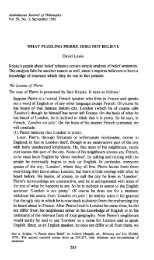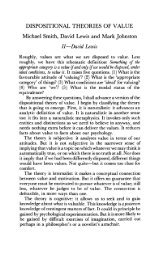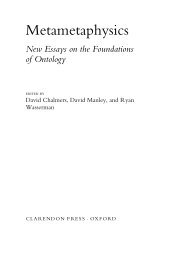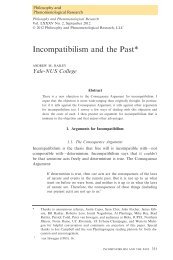A Materialist Ontology of the Human Person - Andrew M. Bailey
A Materialist Ontology of the Human Person - Andrew M. Bailey
A Materialist Ontology of the Human Person - Andrew M. Bailey
You also want an ePaper? Increase the reach of your titles
YUMPU automatically turns print PDFs into web optimized ePapers that Google loves.
212 Peter van Inwagen<br />
natures <strong>of</strong> <strong>the</strong> things it could possibly be true <strong>of</strong>. We call a property physical<br />
not because it has <strong>the</strong> property being physical but because it entails that property.<br />
And all <strong>the</strong>se points apply, <strong>the</strong> appropriate changes being made, to mental<br />
properties. To call a substance a mental substance is to say something about its<br />
nature; to call a property a mental property is to say something about <strong>the</strong> natures<br />
<strong>of</strong> o<strong>the</strong>r things, <strong>the</strong> things it is possible for it to belong to. Both mental and<br />
physical properties are abstract, Platonic sorts <strong>of</strong> things; just as <strong>the</strong> terms ‘‘novel’’<br />
and ‘‘history’’ do not represent ontologically significant subcategories within <strong>the</strong><br />
category ‘‘book,’’ so <strong>the</strong> terms ‘‘mental property’’ and ‘‘physical property’’ do not<br />
represent ontologically significant subcategories within <strong>the</strong> category ‘‘property’’.<br />
IwillreturntothispointwhenIdiscuss<strong>the</strong><strong>the</strong>siscalledpropertydualism.<br />
Now what mental properties continue to be true <strong>of</strong> Sally when <strong>the</strong> evil<br />
genius performs his cosmic conjuring trick? Well, <strong>the</strong> most important one for<br />
our purposes, <strong>the</strong> one that is, so to speak, operative in <strong>the</strong> example, is ra<strong>the</strong>r<br />
hard to express; at least it is hard to express it in a form that does not have<br />
misleading implications. We might call it ‘‘seeing turquoise’’, but this phrase<br />
makes <strong>the</strong> word ‘turquoise’ look like a direct object, a name for something Sally<br />
sees. Chisholm suggested that we might remove this implication by inventing an<br />
adverb, ‘turquoisely’; <strong>the</strong> property Sally continues to have would, according to<br />
this suggestion, be called ‘seeing turquoisely’ or ‘being appeared to turquoisely’.<br />
These are bizarre phrases, but I think it’s pretty clear that <strong>the</strong>re is such a property<br />
as <strong>the</strong> one Chisholm said <strong>the</strong>y denoted. At least this is clear if we assume that a<br />
given piece <strong>of</strong> turquoise looks <strong>the</strong> same in respect <strong>of</strong> color to every human being<br />
with normal color vision who observes it in ideal circumstances—and that is an<br />
assumption I’m going to make. If you want to have this property <strong>the</strong>n, given that<br />
you have normal color vision, examine a piece <strong>of</strong> turquoise in a good light. If you<br />
want to stop having it, close your eyes. I think we all know what this property is,<br />
and it’s evident that it’s a property <strong>of</strong> persons,oratanyrate<strong>of</strong>sentientbeings,and<br />
<strong>of</strong> nothing else. It seems to me to be evident that it’s possible to have this property<br />
even if nothing has <strong>the</strong> property being turquoise in color. Iwouldsaythatten<br />
thousand years ago, very possibly, nothing had <strong>the</strong> property being sky blue.(Maybe<br />
<strong>the</strong>re were sky-blue birds or flowers ten thousand years ago, but let’s suppose not.)<br />
Although nothing was sky-blue in those remote times, anyone who <strong>the</strong>n looked at<br />
<strong>the</strong> sky on a fine day acquired a certain property, <strong>the</strong> property Chisholm would call<br />
‘being appeared to sky-bluely’. (I’m going to have to insist that it’s just false that<br />
in such a case <strong>the</strong> perceiver does see something sky-blue, namely <strong>the</strong> sky. This is<br />
false for <strong>the</strong> very good reason that <strong>the</strong>re is no such thing as <strong>the</strong> sky. And I’m going<br />
to have to insist, too, on <strong>the</strong> falsity <strong>of</strong> <strong>the</strong> <strong>the</strong>sis that <strong>the</strong> mind or consciousness<br />
<strong>of</strong> a person looking at <strong>the</strong> sky contains a sky-blue quale. I insist on this latter<br />
point because no one has ever been able to explain what a quale is. If <strong>the</strong>re are<br />
qualia, <strong>the</strong>n, as a simple matter <strong>of</strong> logic, each quale has, for every property, ei<strong>the</strong>r<br />
that property or its complement, and no one has been able to give a coherent<br />
account <strong>of</strong> what combination <strong>of</strong> properties a quale has. I am willing to defend


